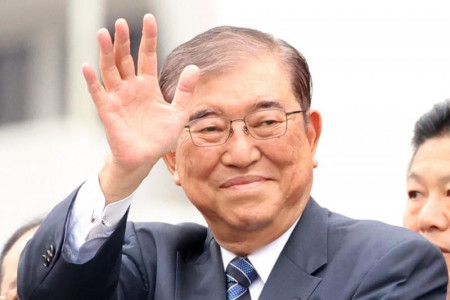
Support Japanese Prime Minister Shigeru Ishiba’s Cabinet has accounted for 24 percent, reads a public opinion poll conducted last weekend by the Mainichi newspaper.
The approval rating has slightly increased as compared to the 23 percent in the previous survey of March 15-16. However, the figure fits into the statistical error. In any case, Ishiba's popularity remains at less than 30 percent, pointing to the Japanese leader’s precarious position. And for the Cabinet of Ministers, the survey conducted on April 12-13 featured a 61 percent level of disapproval.
The reason for the crisis lies in the defeat in last fall elections to the lower house of parliament, in which his Liberal Democratic Party of Japan (LDP) along with its Komeito Party coalition partner lost their majority. Because of this, Ishiba was forced to constantly make concessions to opposition parties, such as raising the minimum income level for relevant tax collection. All of this has affected the prime minister's rankings.
This situation worsened when it became known that Ishiba had given 15 fellow party members vouchers worth about $850 each. This was perceived as a malicious violation of political donation rules, all the more serious an accusation amid the still-to-be-forgotten LDP black cash scandal that cost former Japanese Prime Minister Fumio Kishida his seat.
Ishiba’s image as a politician untainted with financial fraud collapsed overnight, making the rating naturally drop into the red zone. Although senior LDP members and Ishiba’s potential rivals are not explicitly urging his resignation, a former government member told the Yomiuri newspaper: "Everyone thinks they won't be able to hold out for long. If another problem emerges, his administration collapse will come as no surprise."
Interestingly, when discussing potential candidates to replace Ishiba, there regularly comes up Yuichiro Tamaki, leader of the third largest opposition party, the Democratic Party for the People (DPFP).
If the LDP is defeated this summer in the elections to the Tokyo City Assembly and the upper house of parliament, which is highly likely given the country’s rising prices and issues caused by Trump's tariff policy, then, according to observers, the LDP will seek to stabilize its coalition with Komeito, establishing an alliance with the DPFP and thus achieving a strong majority in both chambers of the country's highest legislative body.
Tamaki's co-opting for PM’s chair may become condition for this. Apparently, the calculation is that the leader of the second most respected opposition party is flattered into leading the government, while on the other hand, his views on constitutional changes, foreign policy, and security policy are close to LDP’s.
So far, all these are guesses and estimates that depend on the summer race results, but it is already clear that the LDP leadership crisis, weak economic growth prospects, confusion in relations with the United States and inevitable increase in tensions with China the conservatives to regroup and, if possible, redistribute responsibility for the outcome of inevitable crises.
Yomiuri cites an LDP veteran giving the following assessment of what is going on: "Political environment is chaotic this year, but one thing is for certain: there will be a change of Prime Minister."


